SEO is getting more complex — and AI is changing the rules. If it feels harder to maintain your visibility, you’re not alone.
The days of tidy blue links are fading, traditional rankings are slipping, and AI answers are siphoning traffic. This makes it more challenging than ever to know where to focus your SEO energy.
We get it — you can’t afford to waste hours testing every shiny new tool.
That’s why we did the work for you.
We tried dozens of AI SEO platforms, from newcomers to established names.
The result?
These seven stood out as the most useful in 2026, whether you want to protect your rankings, win visibility in answer engines, or both.
Best AI SEO Tools Comparison
Here’s a side-by-side look at the seven SEO AI tools we recommend. We’ve broken each one down by pricing, best-fit users, and standout features.
| Tool | Starting price/month | Best for | Standout Features |
| Semrush | $139.95 14-day free trial | SEO teams balancing traditional + AI search | Track competitor mentions in AI answers to guide targeted content creation |
| Peec AI | $102 Free trial | Brands monitoring LLM presence & sentiment | Identify high-influence sources shaping AI answers |
| ChatGPT | $20 Free plan available | SEOs and content strategists needing AI-driven insights | Convert raw SEO data into content and optimization ideas |
| ZipTie.dev | $179 Free trial | SEO/content teams targeting AI search | Choose top queries to target and optimize related pages |
| MarketMuse | Custom Free trial available | Content teams building topical authority | Analyze topic gaps and create content to improve AI answer mentions |
| Rankscale | $20 Free trial available upon request | Marketers tracking brand perception in AI | See how your brand is perceived across AI platforms |
| Screaming Frog | $279/year Free plan available | Technical SEOs auditing large sites with AI | Auto-generate missing titles and meta tags for better LLM understanding |
1. Semrush
Best all-in-one tool for traditional and AI search optimization and tracking
Semrush is ideal for teams that want to protect their Google rankings while also gaining visibility in AI-powered search engines.
AI is built into many of Semrush’s core tools, so you get smarter keyword insights, faster fixes, and better content all in one platform.
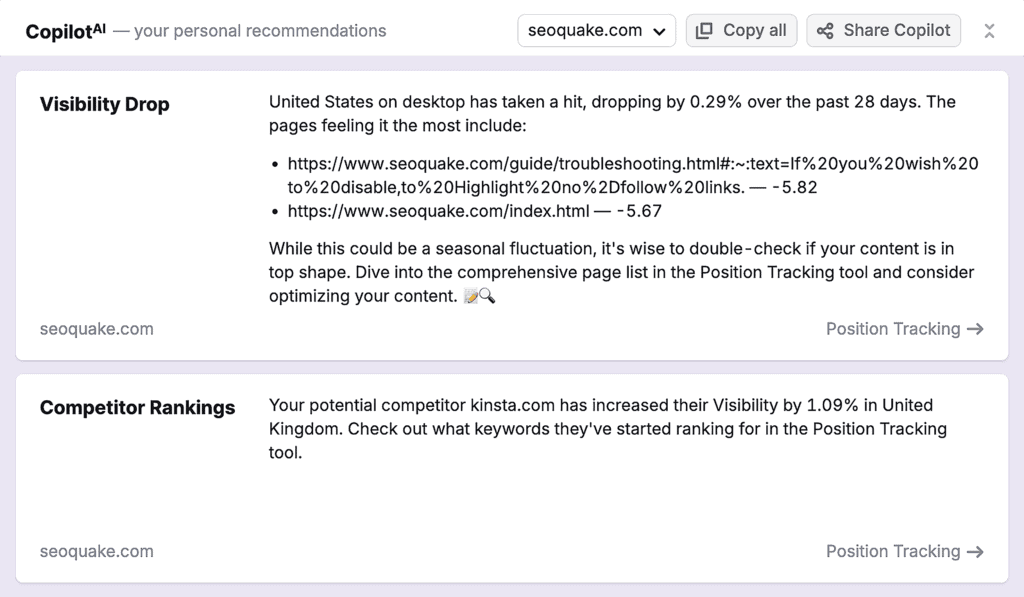
For even deeper AI-driven analysis, Semrush offers two specialized toolkits, both available as standalone products or as add-ons to a full Semrush subscription.
The AI SEO Toolkit lets you track brand and competitor mentions across AI-generated answers in tools like ChatGPT, Gemini, and Perplexity.
You’ll see your share of voice, sentiment (positive, neutral, or negative), and the exact prompts driving mentions.
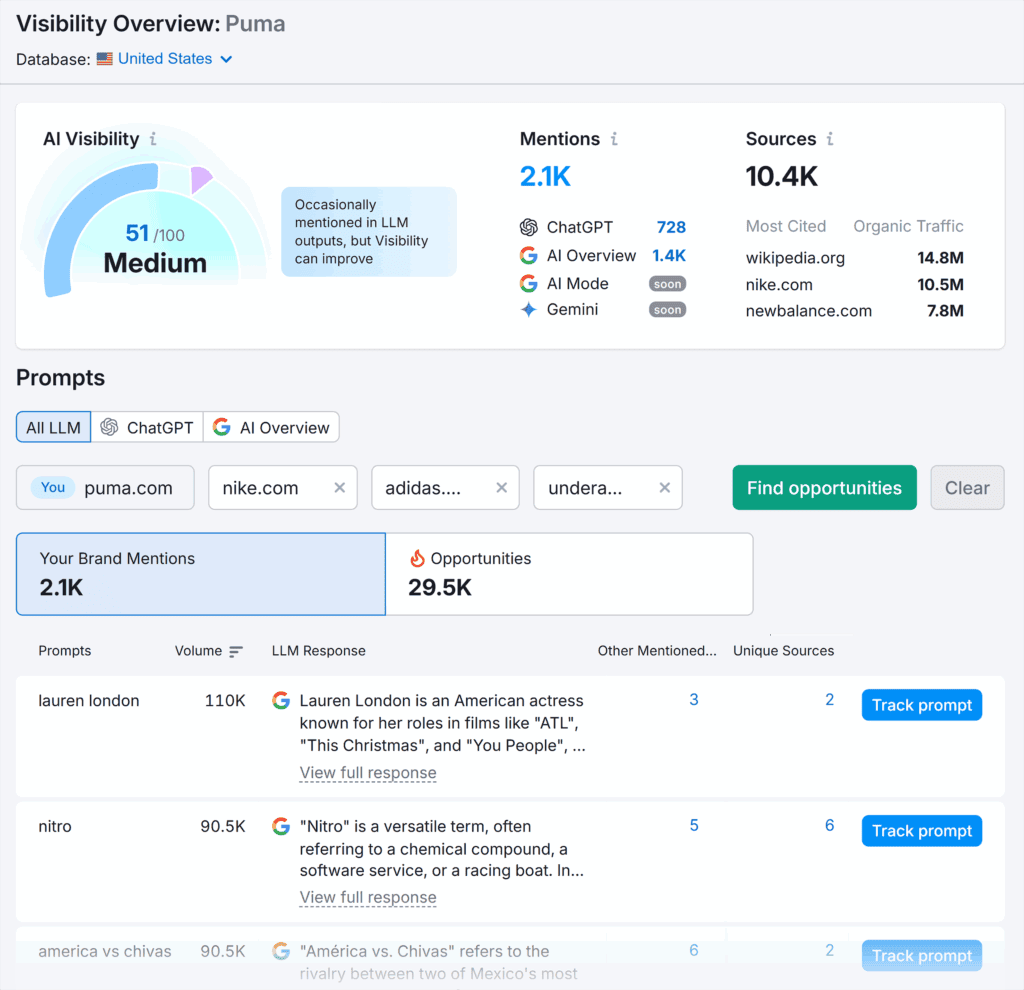
The Content Toolkit uses AI to help you create optimized briefs and drafts tailored to your brand.
It analyzes your visibility opportunities, competitors, and target keywords to suggest data-backed outlines and recommendations.
From there, you can generate full, AI-powered drafts and refine them for readability and SEO to improve your chances of ranking and capturing more traffic.
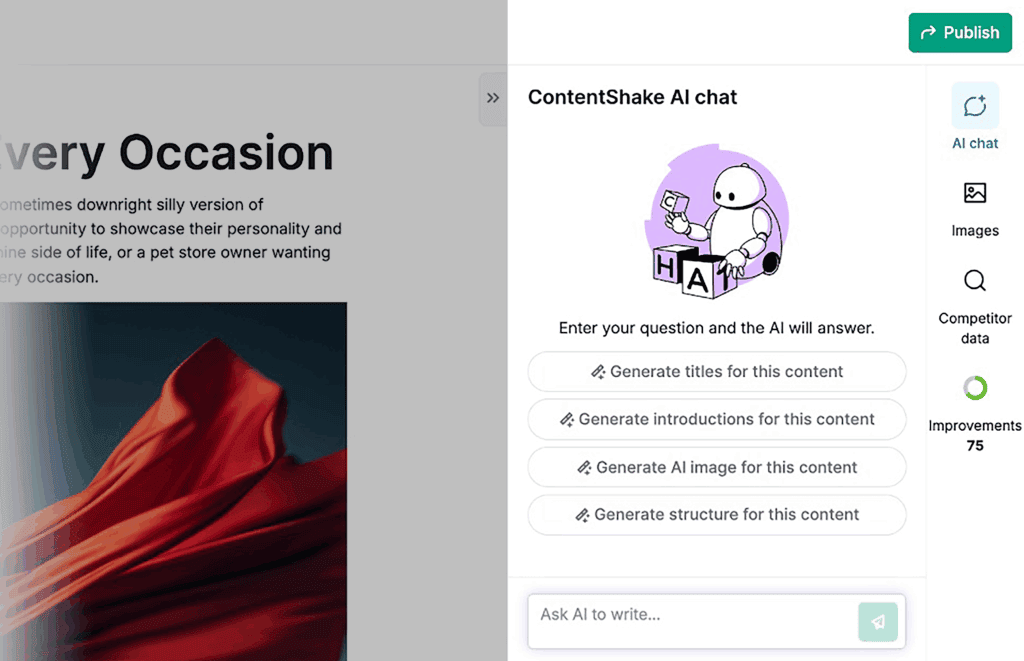
Best Features
- Personalized keyword insights: Semrush’s AI-powered keyword research tools give you customized data based on your domain. This includes your highest-potential keywords and a personalized keyword difficulty (KD) score, so you can focus on the most impactful opportunities.
- AI-powered site audits: Semrush uses AI to assess your site’s health and provides suggested fixes. Quickly spot and prioritize technical and content issues to keep your site running and ranking well.
- Dedicated AI SEO toolkits: Monitor your brand’s performance in LLMs and AI search engines with the AI SEO Toolkit. With the Content Toolkit, you can generate lightning-fast briefs and content for any medium, from email to blog posts.
What to Know Before You Commit
For teams that want everything in one place, from AI-powered keyword research and backlink analysis to competitive insights, it’s hard to beat the depth of tools here.
And with AI features in every plan, Semrush helps you do more than just track rankings.
Primarily interested in tracking brand visibility in AI search results and LLMs? You can purchase the AI SEO Toolkit as a standalone product for $99/month per domain, no full Semrush subscription required.
The same applies to the Content Toolkit, which can also be bought separately.
That said, if you want access to the full Semrush platform plus either of these advanced toolkits, you’ll need both a Semrush subscription and the add-on pricing.
Depending on how many features you want to bundle together, the total cost can add up quickly.
But for bigger brands already serious about SEO and want more mentions in LLMs and answer engines, it’s an easy yes.
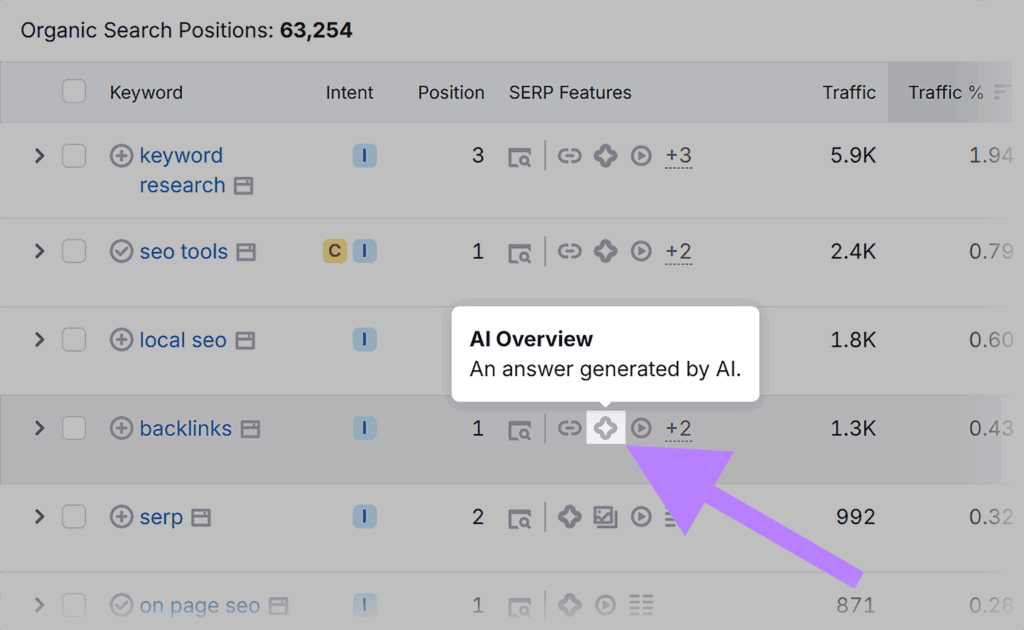
Pricing
Semrush offers three main subscription tiers, starting at $139.95/month. There’s also a custom-priced Enterprise plan for larger teams.
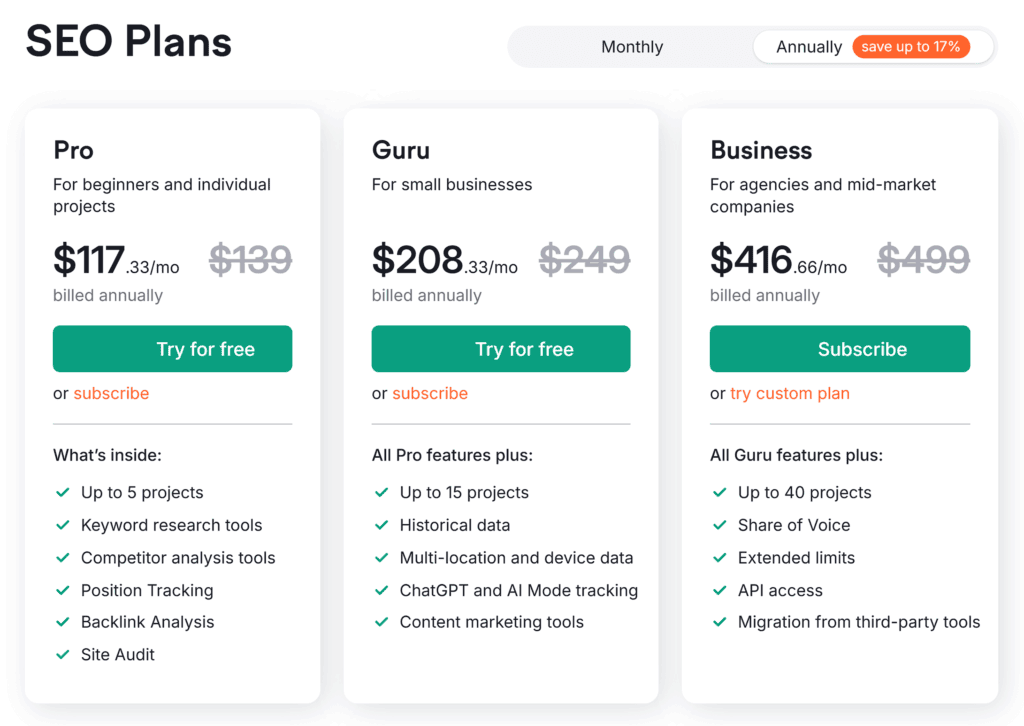
Semrush’s AI assistant, Copilot, comes with every plan. It automatically checks your site and flags technical and content issues.
Plus, many tools, including Site Audit, Keyword Research, and more, are enhanced with AI-driven insights to help you prioritize fixes, refine strategies, and uncover opportunities.
Guru and Business plans also come with AI search tracking to help you monitor how your brand appears in Google’s AI Overviews (AIOs).
Additional AI-powered toolkits are available on their own or with a subscription:
- AI SEO Toolkit ($99/month per domain): Tracks brand and competitor visibility in AI engines like ChatGPT, Gemini, and Perplexity. Includes share of voice, prompts driving mentions, and sentiment analysis.
- Content Toolkit ($60/month): Provides AI-powered content briefs, outlines, and drafting support to complement your SEO strategy
Get a Free 14-day Semrush Pro Trial
2. Peec AI
Best for tracking brand mentions in LLMs and answer engines
Peec AI tracks your brand’s presence on major AI platforms, like ChatGPT, Gemini, and Perplexity.
It shows which prompts or questions often lead to your brand mentions. The platform also measures the tone of those mentions, categorizing them as positive, neutral, or critical.
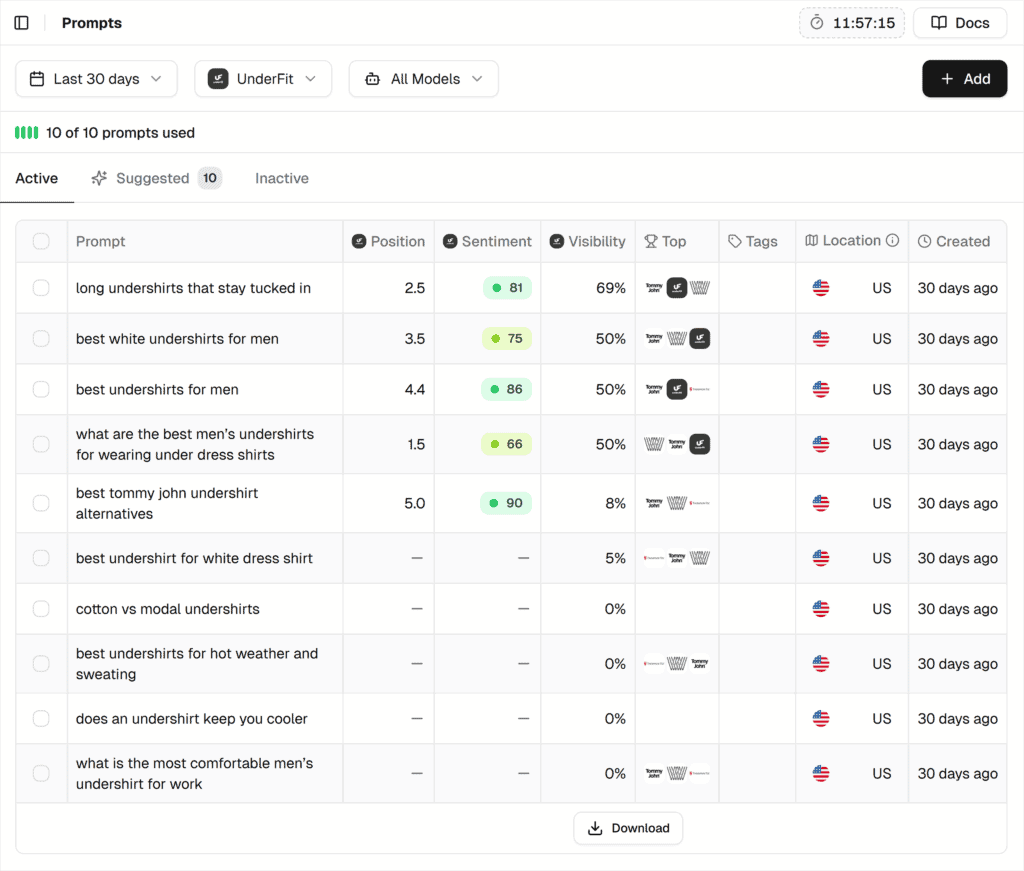
It’s a good choice for teams starting to track AI search visibility and compare performance against competitors.
For example, you might want to appear in AI answers for a certain query, but Peec AI’s data reveals that you barely show up. With that insight, you can act fast by improving your content or launching digital PR campaigns.
Best Features
- LLM visibility and sentiment analysis: Track brand mentions in AI Overviews and other LLMs while gauging sentiment. Review source links to identify reputational risks like misleading or inaccurate claims and uncover opportunities to highlight positive coverage.
- Real-time AI search alerts: Get notifications when brand visibility changes. Respond to sentiment drops by quickly correcting or updating content before issues escalate.
- Competitor benchmarking: Compare brand mentions in LLMs against competitors. Identify leaders in your space where competitors are winning so you can take steps to close the gap.
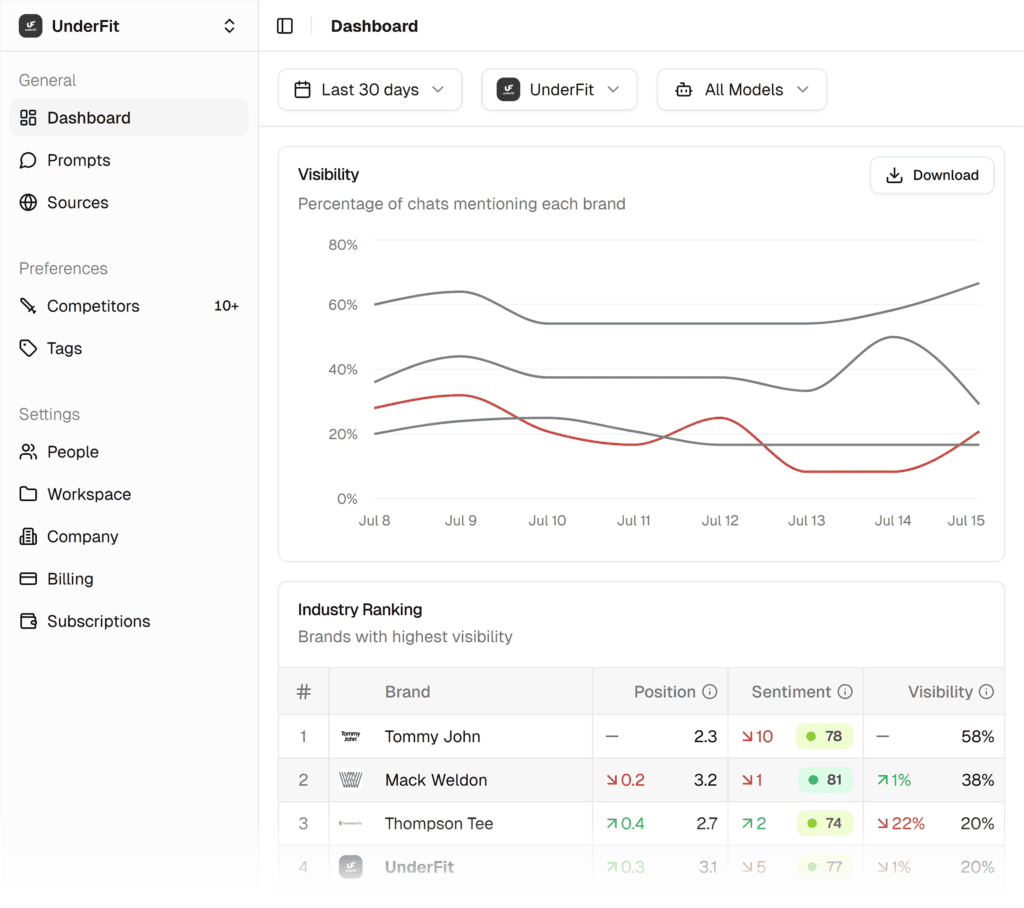
What to Know Before You Commit
Peec AI is a monitoring tool that tracks brand mentions and sentiment, but it doesn’t tell you how to act on those insights. Plus, it lacks traditional SEO capabilities, such as keyword research or rank tracking.
If your main goal is to understand how your brand appears in LLMs, Peec AI can give you that insight. But you’ll still need other tools to cover the rest of your SEO needs.
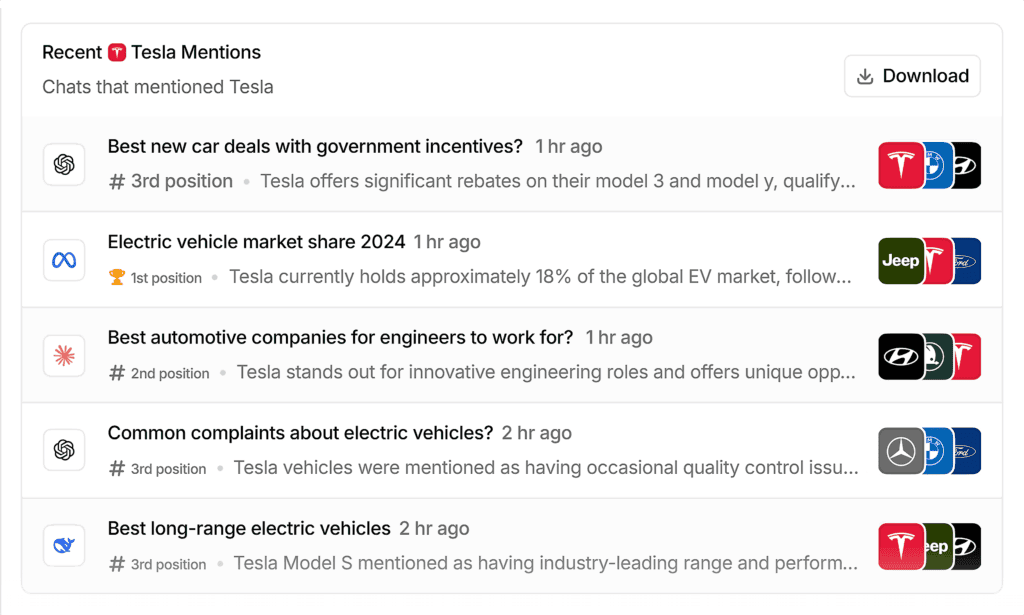
Pricing
Peec AI offers three pricing tiers. Plans are listed in euros, but the lowest tier is roughly $102 per month in U.S. dollars, depending on the exchange rate.
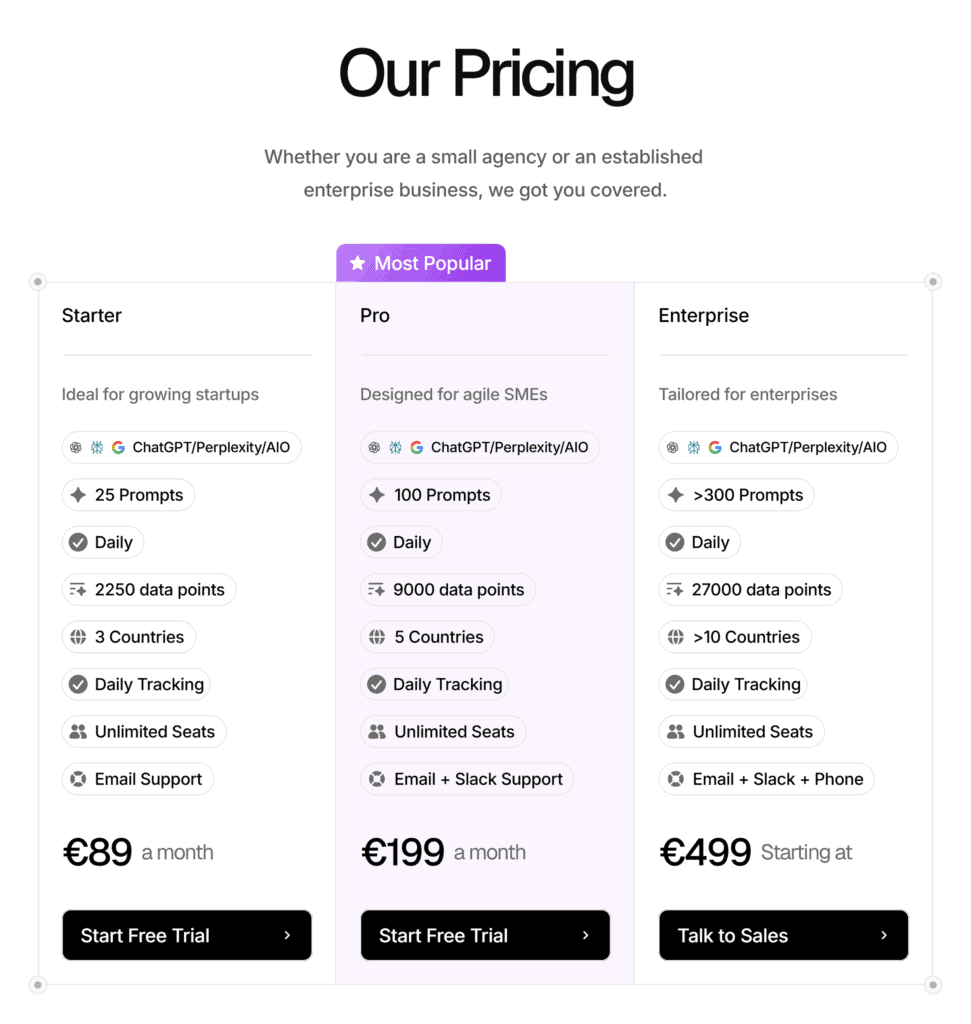
It includes AI visibility tracking in ChatGPT, Perplexity, and AI Overviews. Access to advanced AI models is available at an additional cost.
3. ChatGPT
Best for interpreting AI SEO ranking data
ChatGPT, and similar platforms like Claude and Gemini, are unique because they’re not just SEO tools; they’re also platforms where your brand’s visibility matters.
Many people use ChatGPT for content creation. But it’s just as useful for data analysis, digital PR campaigns, and other day-to-day SEO tasks.
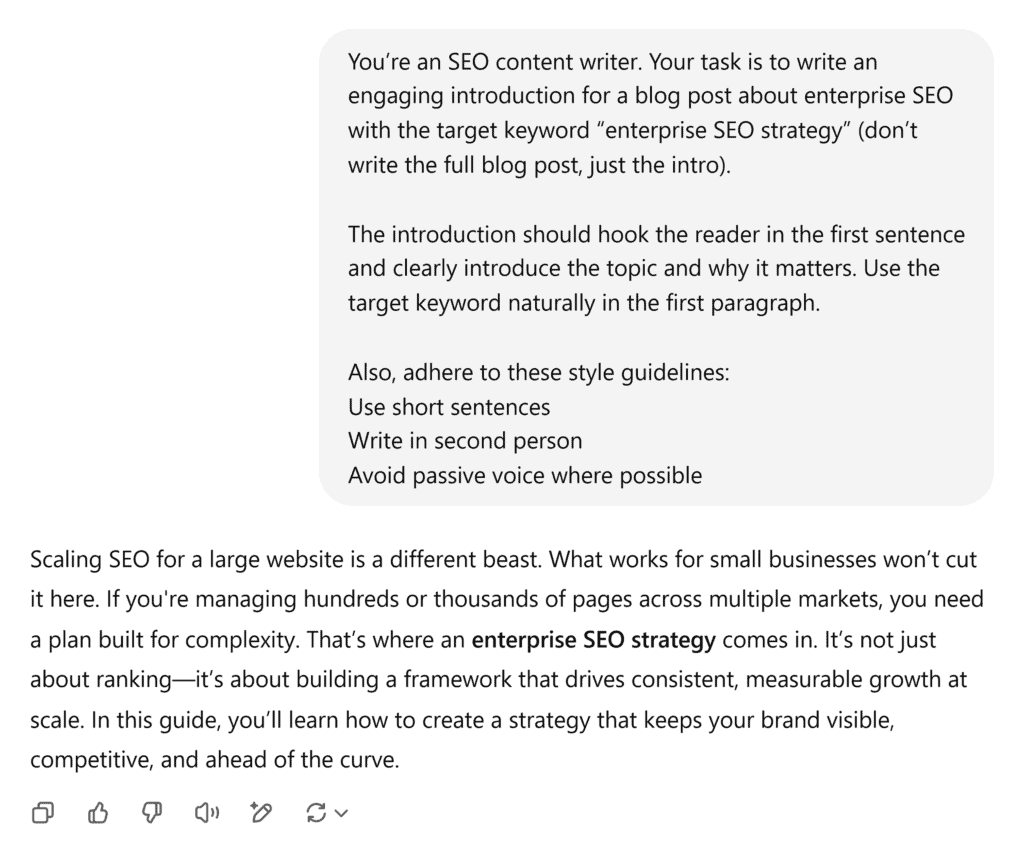
Teams using SEO platforms like Peec can pair them with ChatGPT to deepen insights. For example, since Peec doesn’t provide next steps, you can feed ChatGPT your visibility and sentiment data and have it generate a step-by-step action plan to improve your AI visibility.
Best Features
- Questions and topics research: Find the queries and related entities people use to search for your product in LLMs. Create content that matches those queries and includes those entities.
- Alt text and caption generation: Upload assets like images or charts and get descriptive alt text and captions, giving AI engines richer, multi-modal context to reference in answers
- Competitor intelligence: Compare your pages against top-cited sources in AI answers. Identify what’s missing in your content and optimize it for LLM visibility.
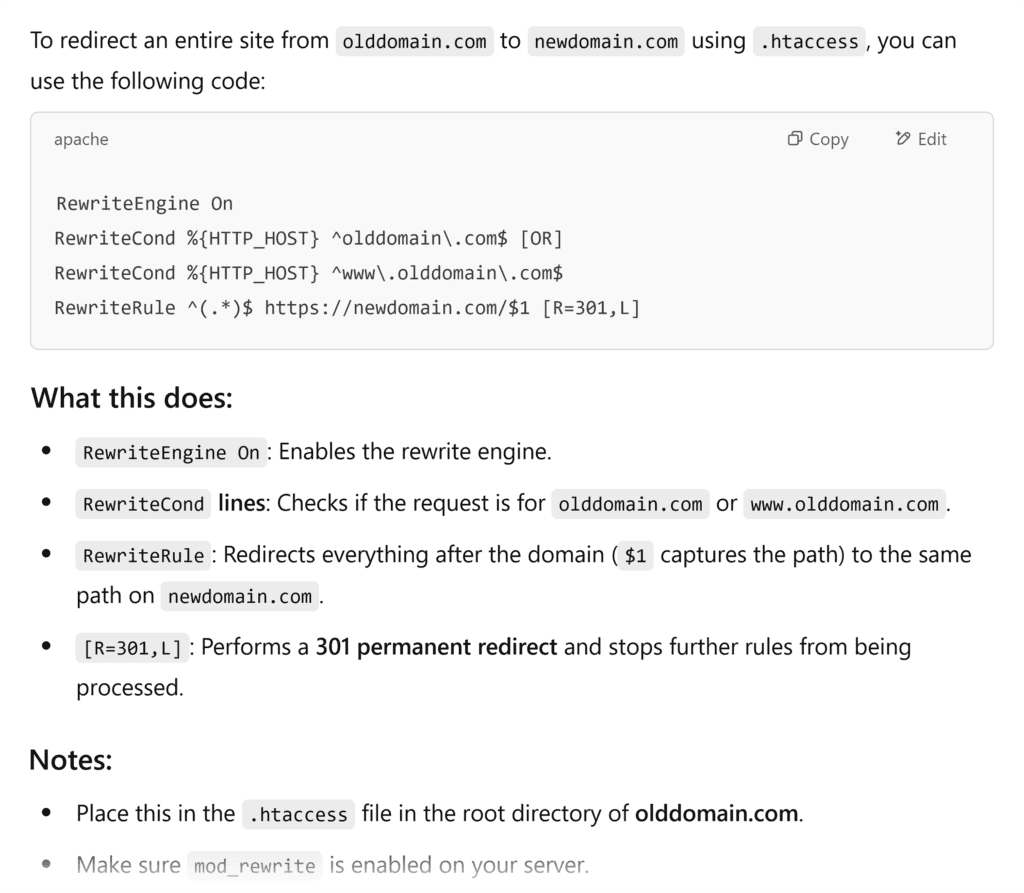
What to Know Before You Commit
ChatGPT’s conversational flexibility is its strength and weakness.
The quality of its answers depends on how you prompt it. If your prompts are vague or unclear, you’ll often get generic answers.
Because ChatGPT is trained on general public data, you’ll get better results when you give it specific details. Include info like real-world data and strategic goals.
That way, your ChatGPT SEO prompts generate more relevant results.
Pro tip: Beware of AI hallucinations. ChatGPT can invent facts, stats, or sources. Always fact-check and ensure human oversight before publishing.
Pricing
ChatGPT offers two main paid plans:
- The Plus plan costs $20/month. It gives you standard access to the latest ChatGPT model.
- The Pro Plan costs $200/month and is built for heavy users. It includes higher limits on messaging, file uploads, data analysis, and image generation. You also get advanced voice with video/screensharing, extended ChatGPT agent access, and extended video generation.
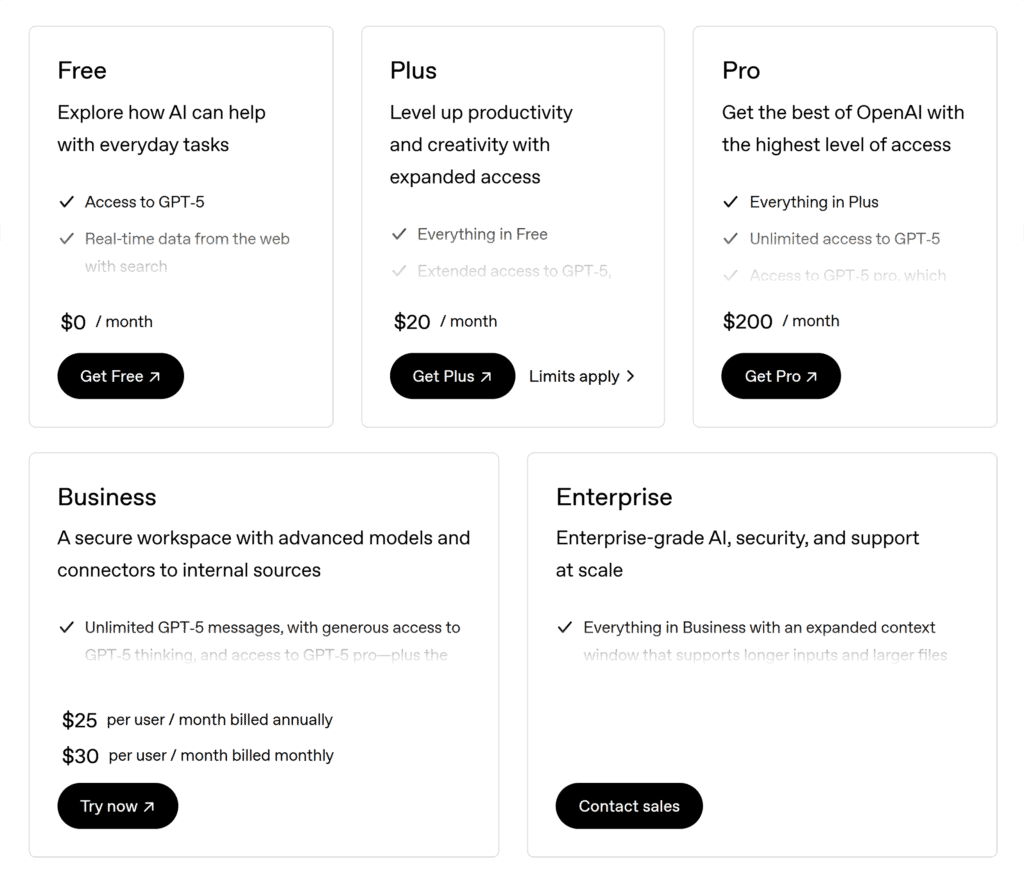
For larger teams, there are Team and Enterprise plans. These offer advanced data privacy, admin controls, and collaborative workspaces.
4. ZipTie.dev
Best for identifying high-impact AI queries for your brand
ZipTie.dev tracks how your brand appears in ChatGPT, Perplexity, and Google AI Overviews. Then, it tells you where to focus your efforts to influence LLMs.
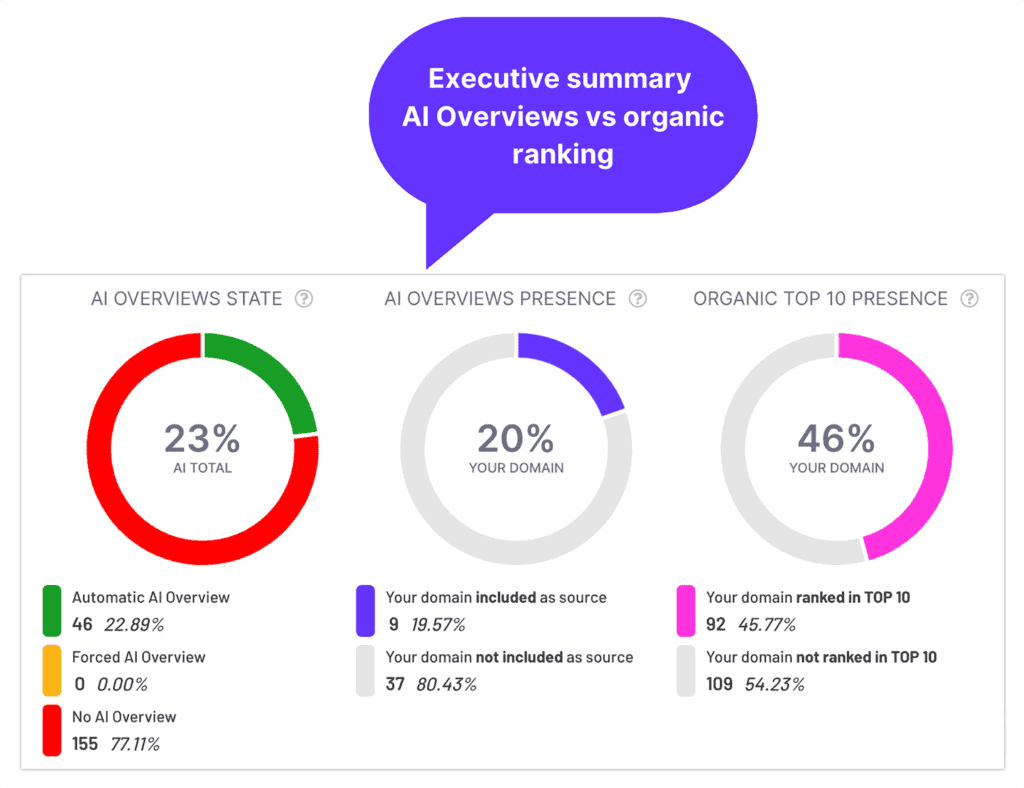
It’s ideal for teams who want to know their performance in AI search before investing more time and money.
For example, its AI Success Score indicates where your efforts can have the most impact. Whether that’s earning more brand mentions or improving authority signals.
Once you know where to focus, you can then use the content optimization module to update your pages.
Best Features
- Multi-country LLM tracking: Monitor AI search presence in 10+ countries, including Poland, Spain, Germany, and the Netherlands. Get country-specific data for international SEO teams.
- Content optimization using AI: Boost content performance in AI search results. Paste any article and get recommendations that align with LLMs’ quality signals.
- Query generation: Generate queries for your brand, product, or topic. Then use its AI Success Score to decide which content to create or update.
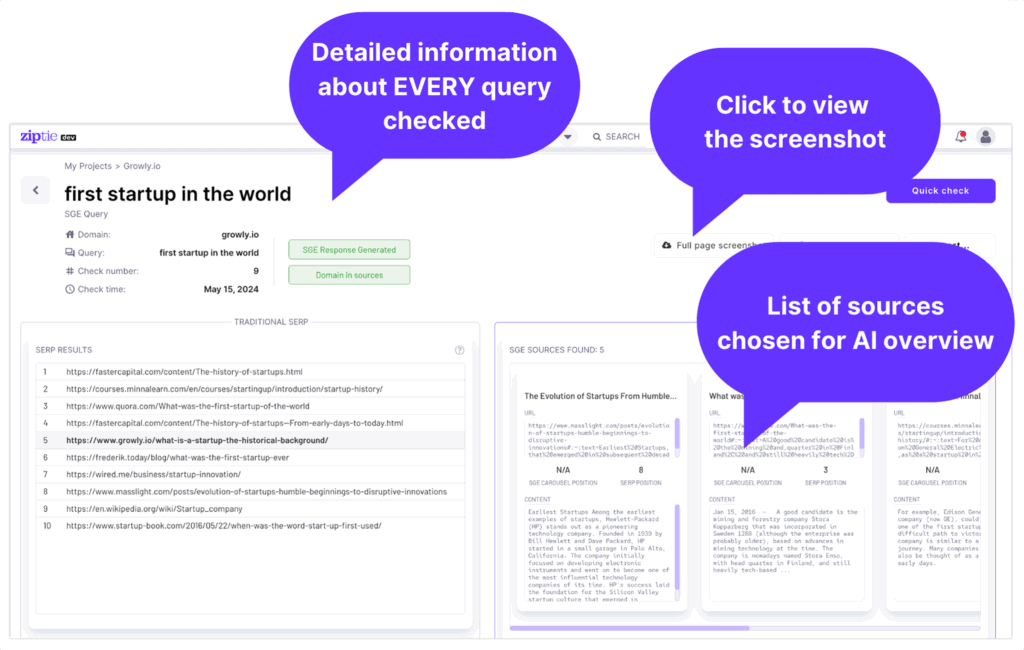
What to Know Before You Commit
ZipTie.dev helps you optimize content based on how LLMs currently surface information.
Like many SEO AI marketing tools born in response to the AI search shift, it’s still maturing. So, it lacks the depth and breadth of traditional SEO platforms.
Plus, since AI changes so fast, the updates you make today might not always work the same way later.
Still, ZipTie.dev is grounded in current knowledge about how AI tools behave. If you want to follow today’s best practices for AI search, it’s a useful way to make your content appear more often in AI answers.
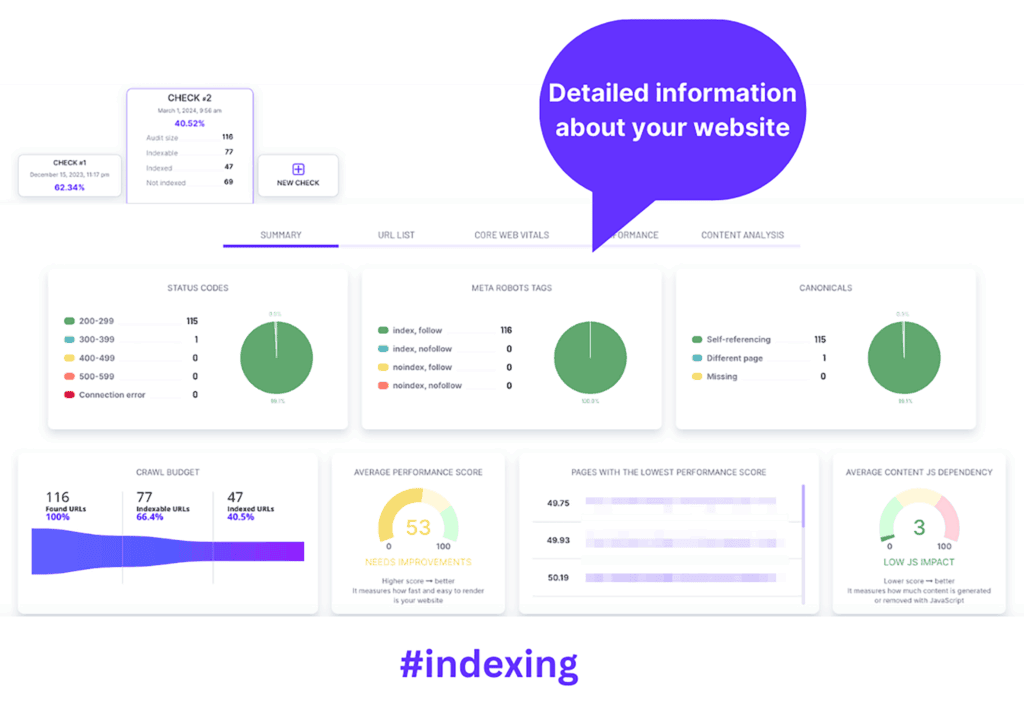
Pricing
ZipTie offers three tiers, starting at $179/month.
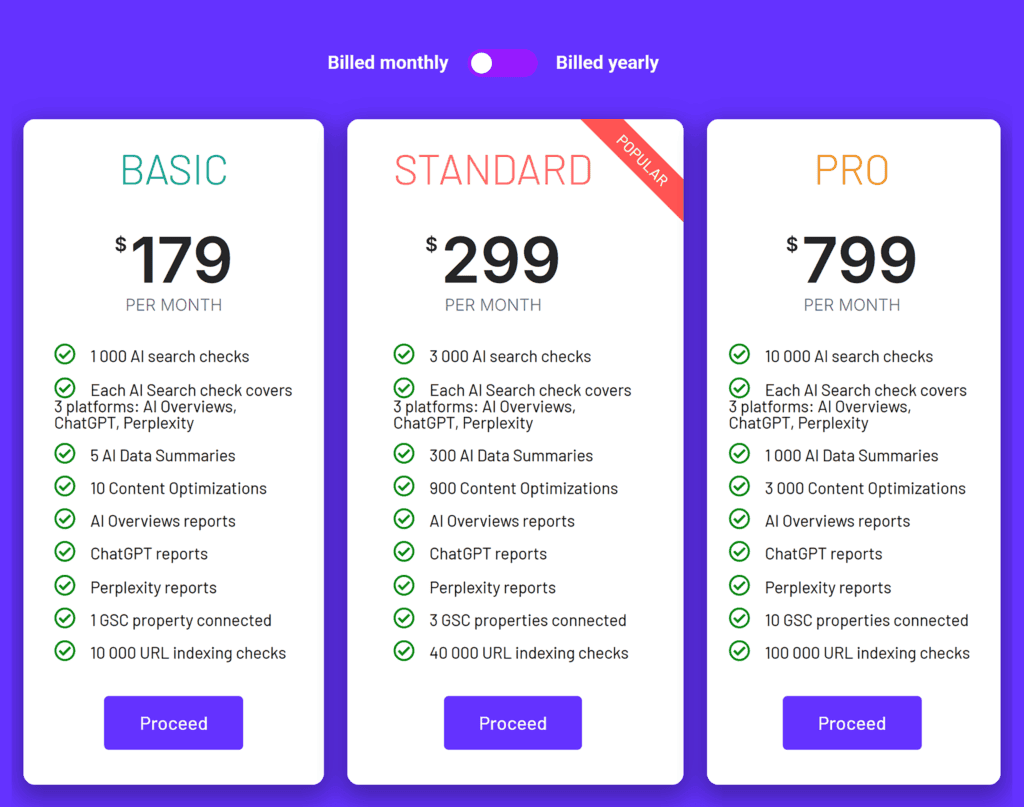
The base plan includes 1,000 AI search checks on Google AI Overviews, ChatGPT, and Perplexity. Higher tiers give you more search checks, and larger optimization limits. Free trial available.
5. MarketMuse
Best for building and boosting topical authority
MarketMuse works differently from most AI SEO tools. Its main focus is building topical authority, using its patented topic-modelling technology.
Instead of just counting keyword frequency metrics (like TF-IDF), it analyzes the full scope of a subject. Then it shows you the subtopics, key terms, and questions you need to cover.
This way, you’ll know where your site is missing content and how to fill those gaps so LLMs see you as an expert.
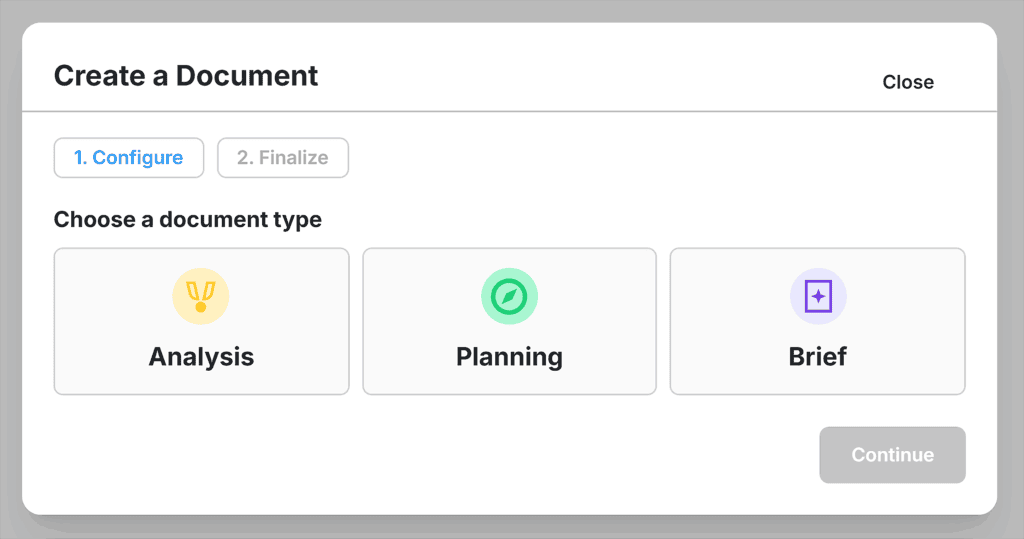
For example, you could use MarketMuse to analyze your site’s coverage of “sports nutrition.” You might discover you’re missing content about sports drinks.
With that insight, you can create targeted content around that niche topic for better visibility in AI search results.
Best Features
- Deep semantic topic modelling: Map subtopics and related ideas around your core themes. Identify content to add or improve to boost expertise and topical authority.
- AI content writing with topic intelligence: Generate briefs from deep topic analysis. Then, draft, optimize, and plan content in one workflow.
- Content planning with AI: Build content maps and calendars. Easily refresh, merge, or remove pages to boost overall site authority.
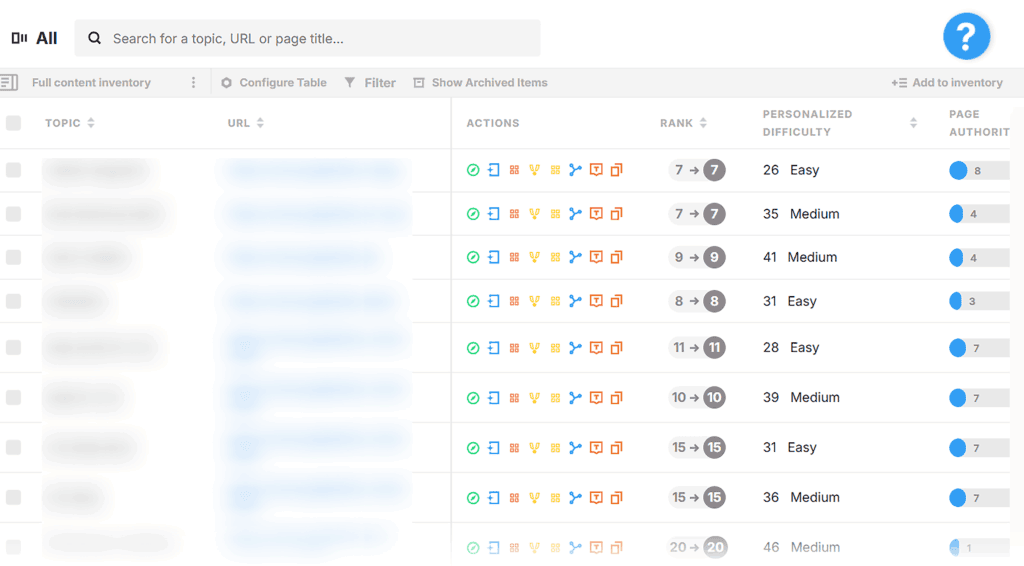
What to Know Before You Commit
MarketMuse is mainly a content optimization tool that uses topic modeling and competitive gap analysis to boost your content strategy.
To get the most from it, your site needs a level of content maturity (meaning enough existing content) for the AI to provide tailored insights.
Also worth noting: Its keyword volume data and rank tracking aren’t as deep as platforms like Semrush or Ahrefs. Plus, it doesn’t track AI answer engines.
Bottom line: If your priority is on topical authority, MarketMuse is a good fit. But for a broader AI SEO toolkit, other platforms might better suit alongside or instead of MarketMuse.
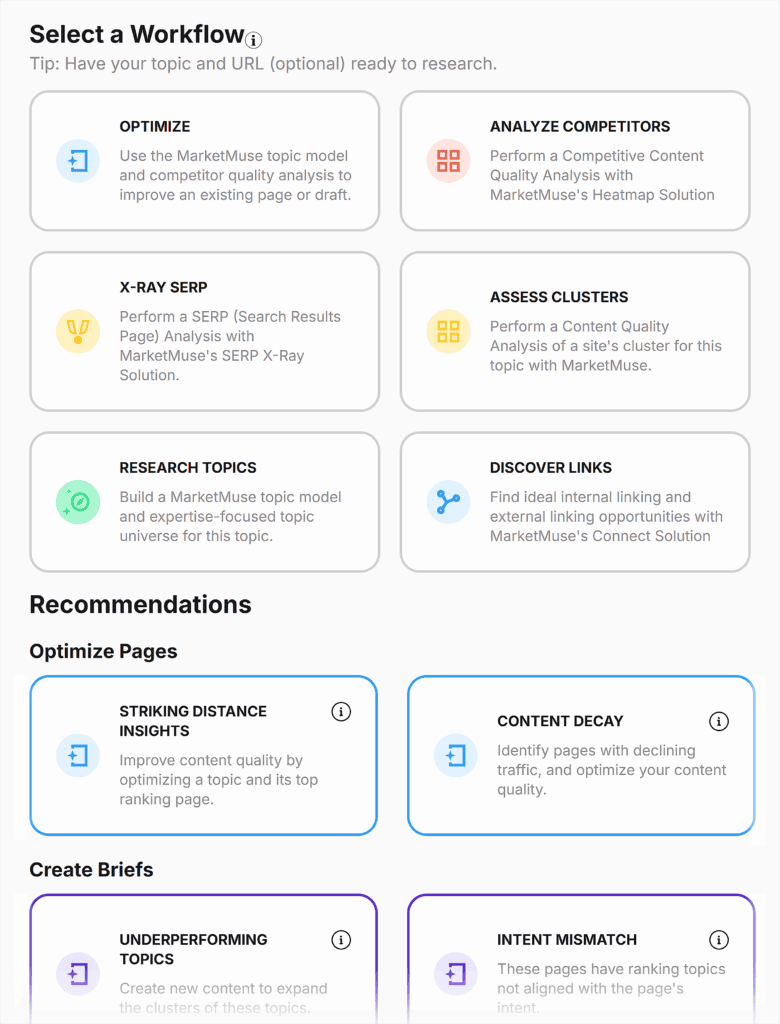
Pricing
MarketMuse offers four pricing tiers. Pricing is based on the number of tracked topics, content briefs, and strategy documents. All plans are custom.
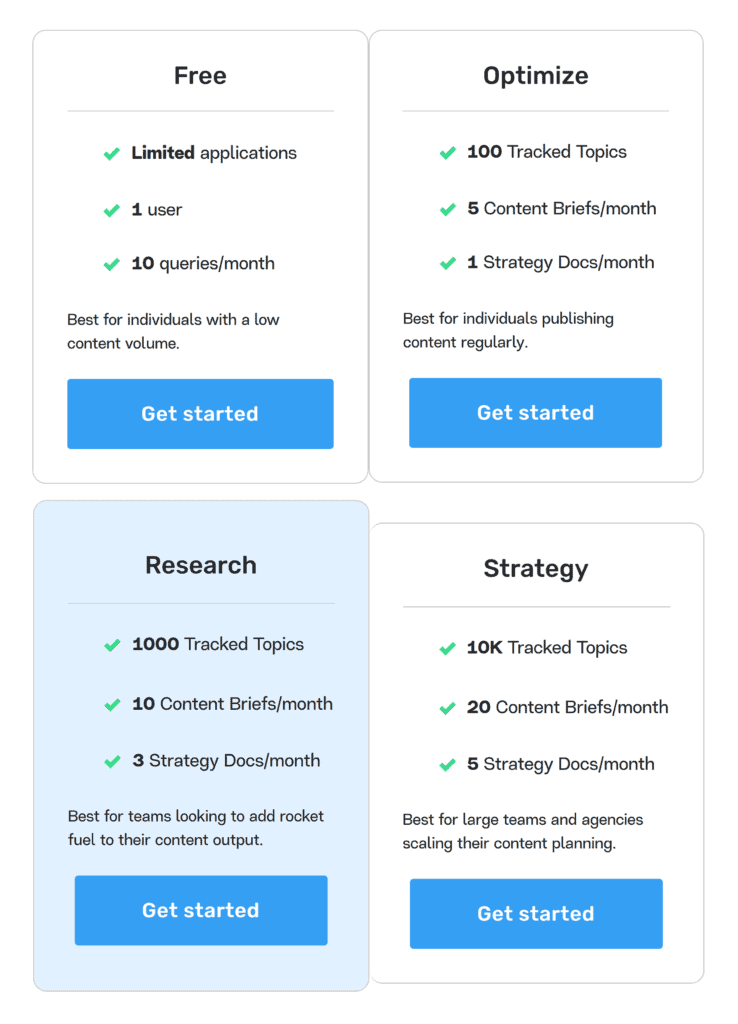
A free trial is available, but with very limited AI features and usage.
6. Rankscale
Best for broad, multi-LLM monitoring
Rankscale gives you a comprehensive view of your brand mentions in multiple LLMs and answer engines. This includes ChatGPT, Google Gemini, Perplexity, and DeepSeek.
It measures the frequency and context of your mentions, then keeps a running history so you can see trends and changes.
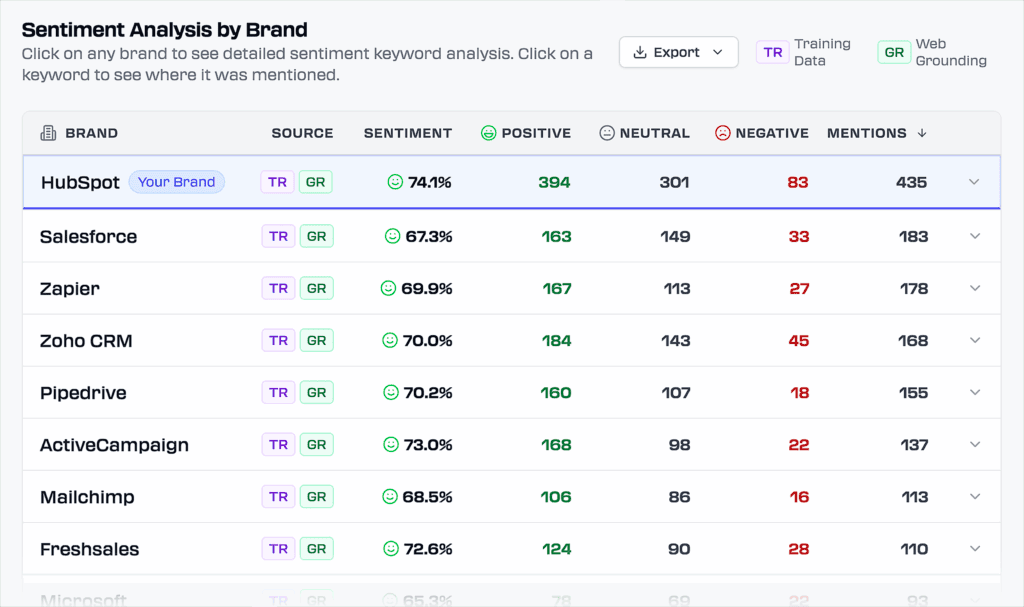
For teams that want to track and grow their visibility in many AI platforms (not just one or two), Rankscale provides the data you need.
Best Features
- Multi-LLM monitoring: Track related topics and queries in ChatGPT, Claude, Perplexity, Gemini, and Google AI Overviews. See where your brand dominates and where you need to improve.
- AI visibility tracking: Measure citations, detection rates, and brand mentions in LLMs. Strengthen authority signals to earn more references in AI answer engines.
- AI-readiness content audit: Assess how your site appears in AI answers. Fix technical issues, underperforming content, and other gaps that hurt your LLM visibility.
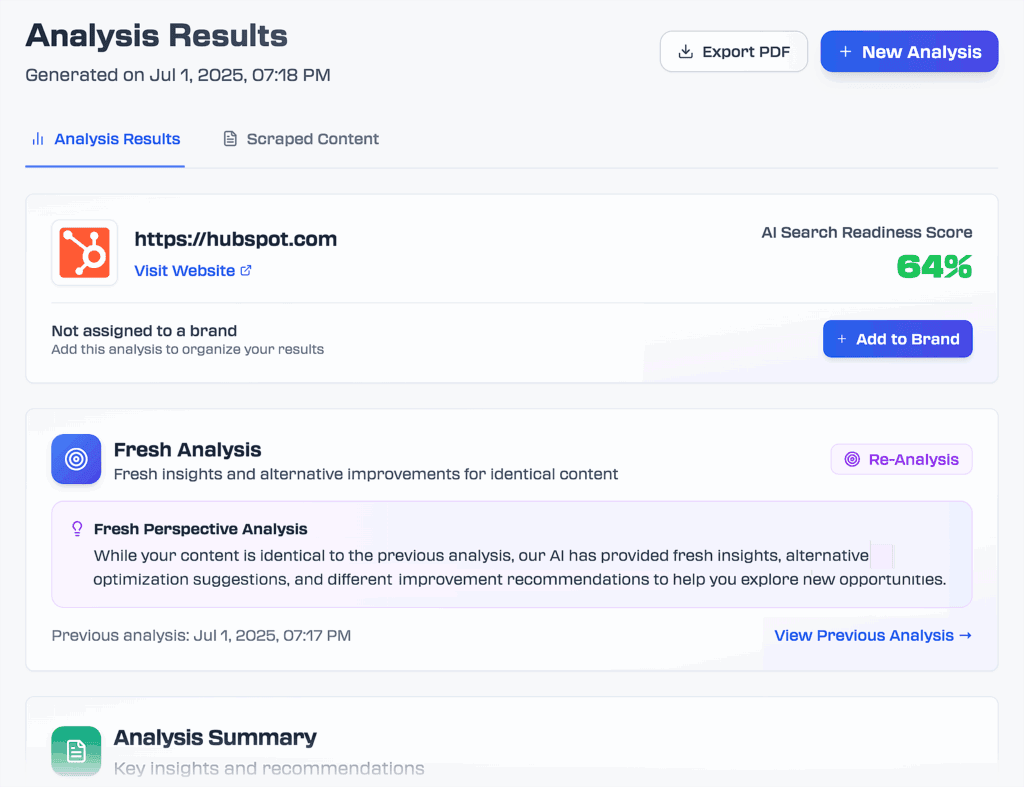
What to Know Before You Commit
Rankscale focuses only on generative engine optimization. So, it won’t help with basic SEO tasks like keyword research or backlink analysis.
Since most website visitors still come from regular search, use this tool alongside a full SEO platform like Semrush. That way, you cover traditional search rankings and AI visibility.
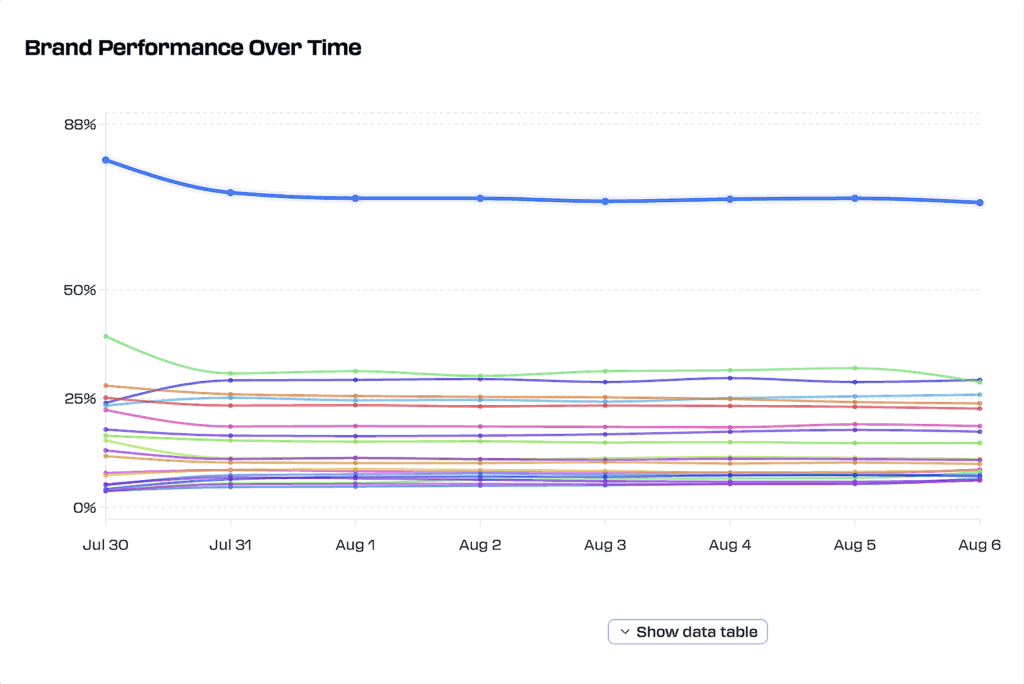
Pricing
Rankscale starts at $20/month for 120 credits. Pricing increases sharply at higher tiers.
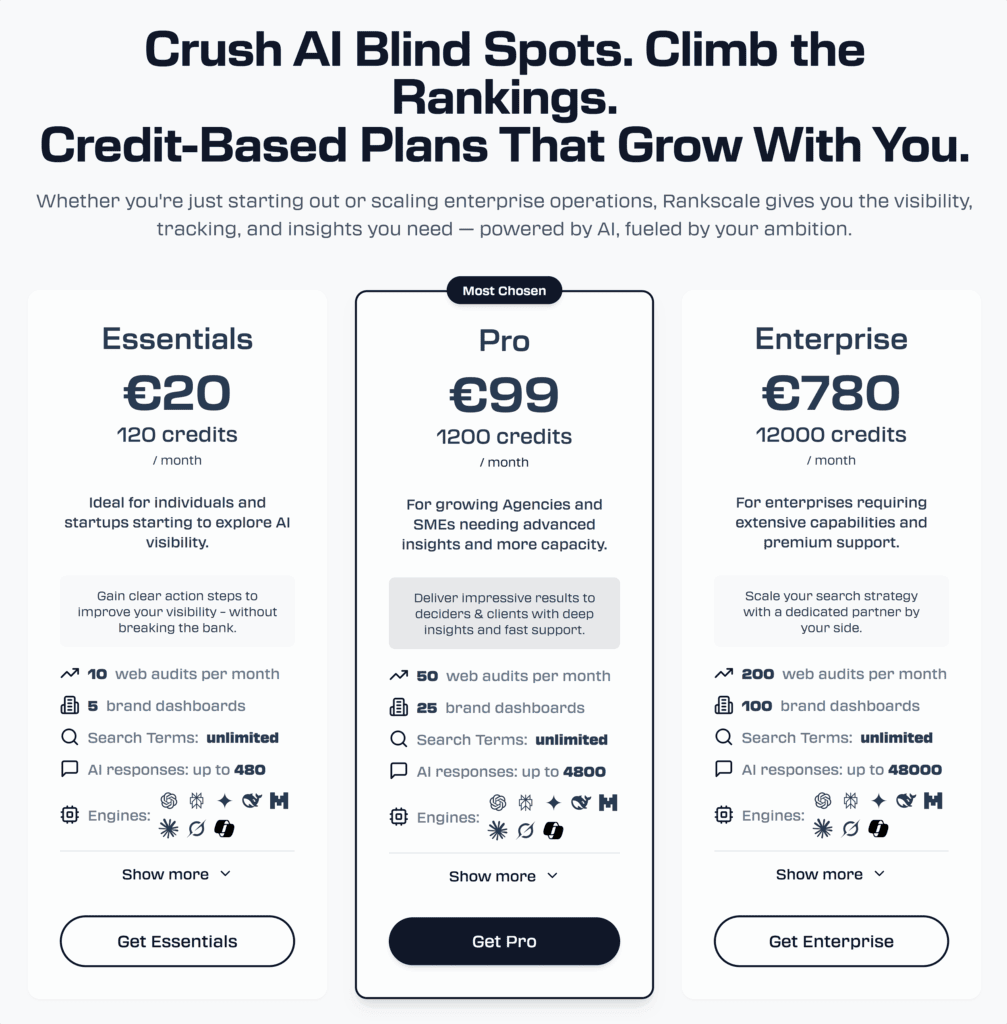
The Agency/SME plan jumps to $99/month for 1,200 credits. The Enterprise plan rises to $780/month for 12,000 credits.
7. Screaming Frog SEO Spider
Best for technical SEO and detailed site health analysis
Screaming Frog SEO Spider is a leading tool for technical site audits.
It’s not marketed as an AI SEO tool, but with its new AI integration via OpenAI or other LLMs, it can help your site get more mentions in answer engines.
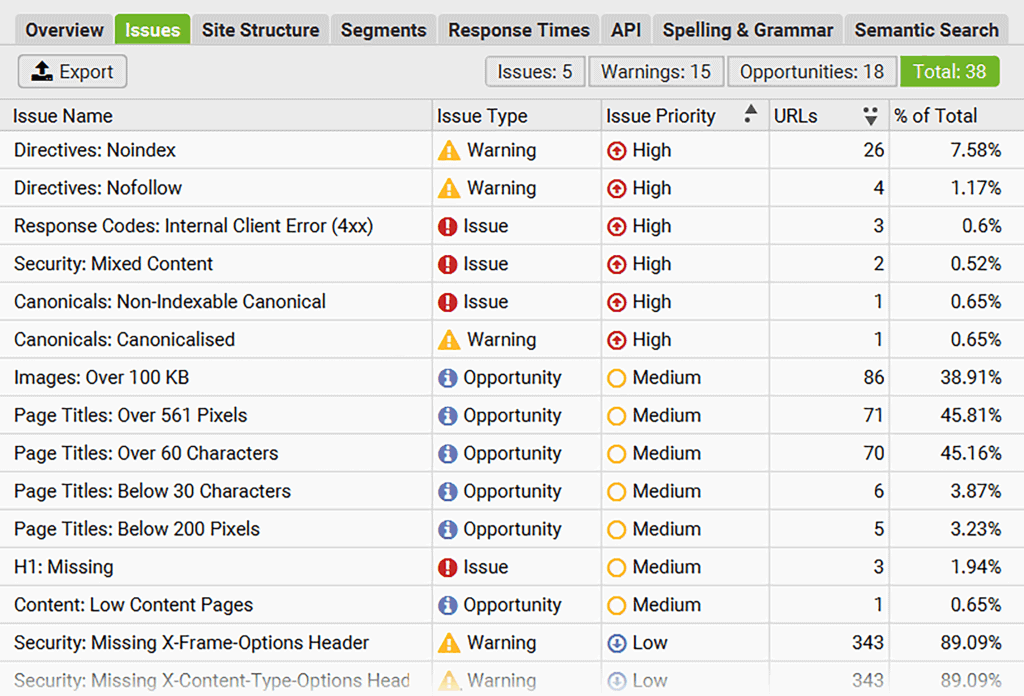
Screaming Frog is perfect for teams managing large, complex websites. It’s very handy when you want to speed up content audits without sacrificing accuracy.
You can run a full crawl, use the tool’s integrated AI-powered semantic similarity analysis to find duplicate content, and quickly see which fixes to prioritize.
Best Features
- AI semantic analysis: Understand how your site’s pages relate by topic, not just keywords. Use semantic clusters to improve internal links and organize your site.
- JavaScript rendering with AI: Crawl JavaScript-heavy pages as Googlebot would. Automatically generate missing meta descriptions and alt tags with Screaming Frog’s AI integration.
- Customizable crawl rules: Set custom rules to target specific site elements (structured data, headings, or meta tags). Then, use the AI integration to identify missing or incorrect elements.
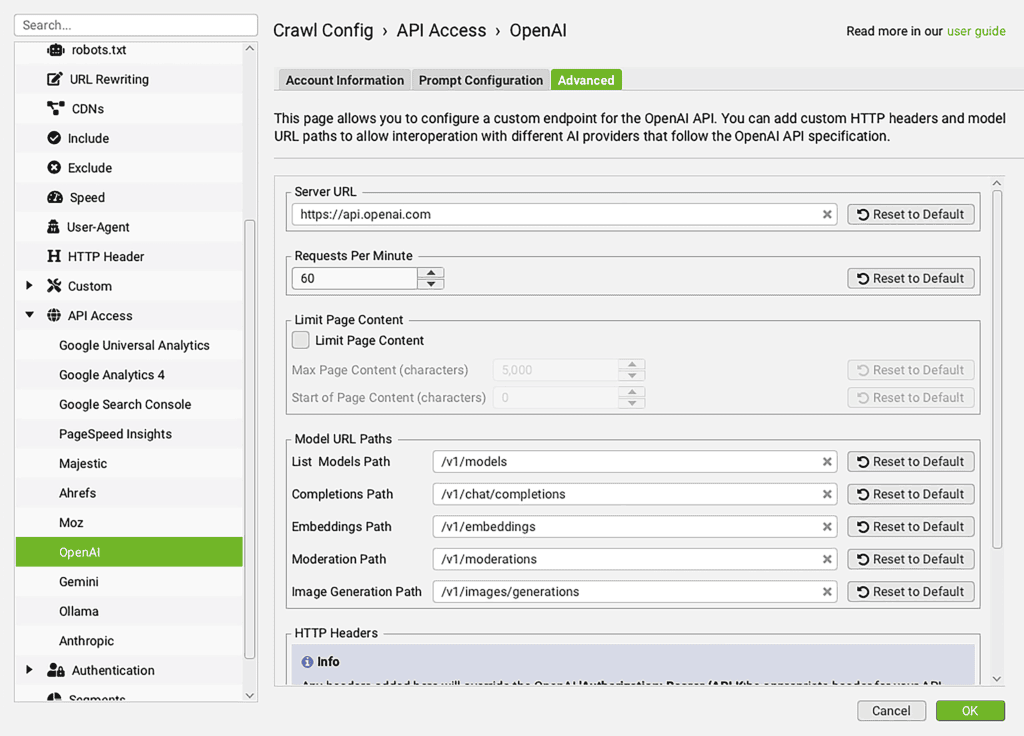
What to Know Before You Commit
Screaming Frog is loaded with features, which make it powerful but daunting. If you’re new to technical SEO audits, the sheer number of tabs can be overwhelming.
It’s also desktop-only, so performance depends on your machine. Crawling very large sites (millions of URLs) requires powerful hardware. Don’t expect a standard laptop to handle enterprise-scale audits.
For its AI features, you’ll need your own API keys. This means separate subscriptions and configurations.
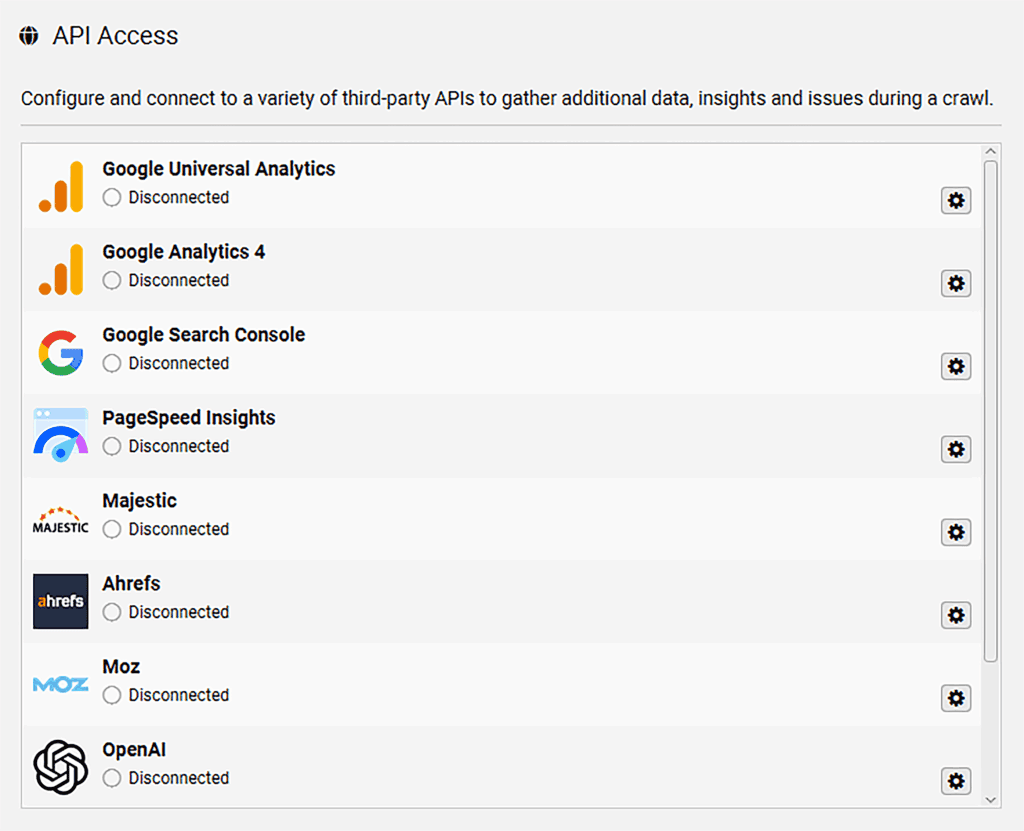
Pricing
Screaming Frog costs $279/year for the full version, which includes no crawl limits and access to all AI features. A free version is available, but is limited to 500 URLs per crawl. It also does not include AI features or advanced configuration options.
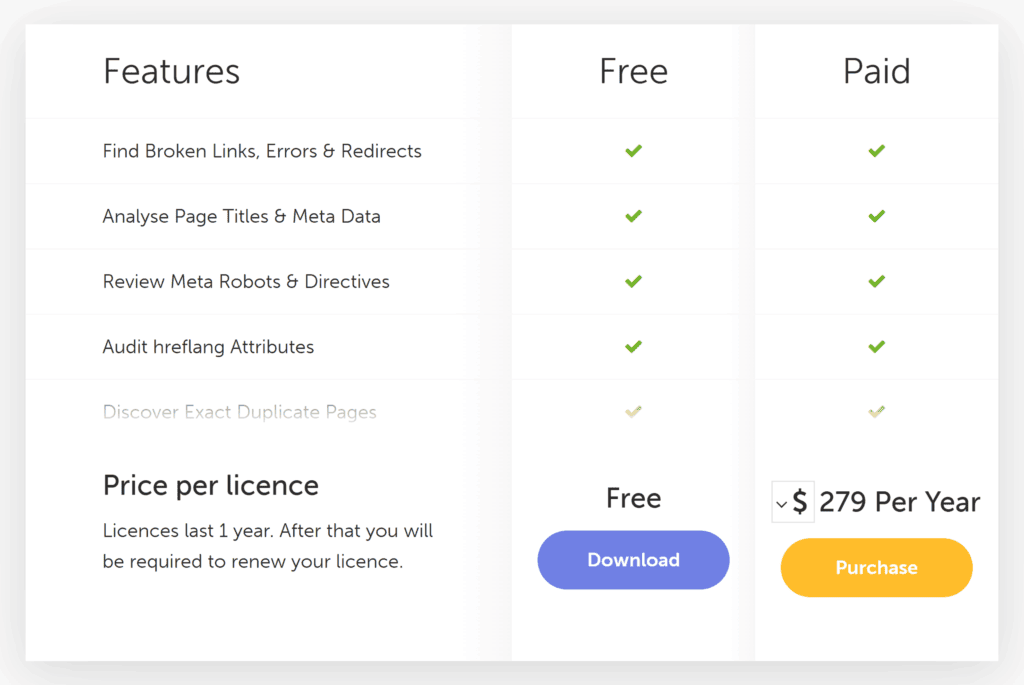
Own Your AI SEO Strategy
AI SEO tools are evolving fast — and so are the models powering them.
From ChatGPT and Gemini to Google’s AI Mode, a growing variety of AI systems now shape how marketers plan, create, and optimize content.
To use these tools effectively, it’s worth understanding how they work and fit into your SEO strategy.
Feeling overwhelmed? Check out our article on the different AI models. It breaks down what they do and how to use them confidently in your day-to-day marketing.
Want to take it to the next level? Join the TTT Academy and get hands-on training to master AI-powered SEO strategies.